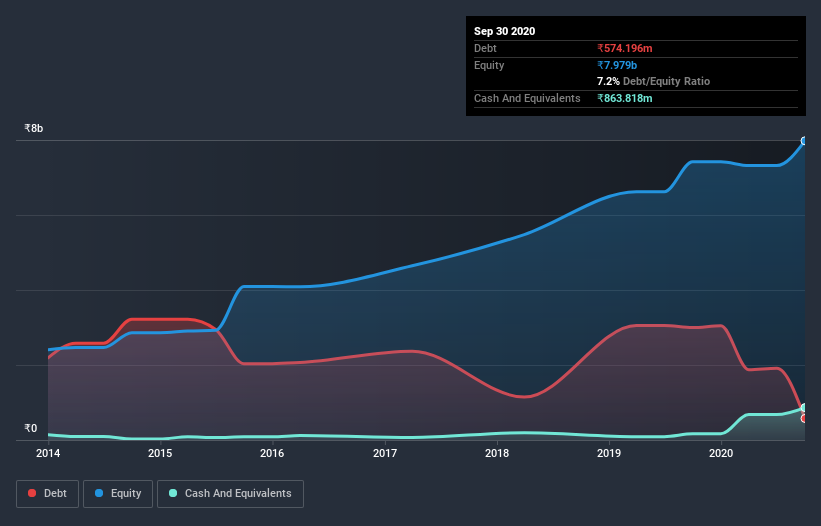These 4 Measures Indicate That Insecticides (India) (NSE:INSECTICID) Is Using Debt Reasonably Well

David Iben put it well when he said, 'Volatility is not a risk we care about. What we care about is avoiding the permanent loss of capital.' When we think about how risky a company is, we always like to look at its use of debt, since debt overload can lead to ruin. We can see that Insecticides (India) Limited (NSE:INSECTICID) does use debt in its business. But the real question is whether this debt is making the company risky.
When Is Debt A Problem?
Generally speaking, debt only becomes a real problem when a company can't easily pay it off, either by raising capital or with its own cash flow. Part and parcel of capitalism is the process of 'creative destruction' where failed businesses are mercilessly liquidated by their bankers. While that is not too common, we often do see indebted companies permanently diluting shareholders because lenders force them to raise capital at a distressed price. Of course, debt can be an important tool in businesses, particularly capital heavy businesses. The first step when considering a company's debt levels is to consider its cash and debt together.
See our latest analysis for Insecticides (India)
What Is Insecticides (India)'s Net Debt?
The image below, which you can click on for greater detail, shows that Insecticides (India) had debt of ₹574.2m at the end of September 2020, a reduction from ₹3.00b over a year. However, it does have ₹863.8m in cash offsetting this, leading to net cash of ₹289.6m.

How Strong Is Insecticides (India)'s Balance Sheet?
The latest balance sheet data shows that Insecticides (India) had liabilities of ₹4.63b due within a year, and liabilities of ₹228.8m falling due after that. Offsetting this, it had ₹863.8m in cash and ₹3.44b in receivables that were due within 12 months. So it has liabilities totalling ₹554.4m more than its cash and near-term receivables, combined.
Of course, Insecticides (India) has a market capitalization of ₹9.12b, so these liabilities are probably manageable. But there are sufficient liabilities that we would certainly recommend shareholders continue to monitor the balance sheet, going forward. Despite its noteworthy liabilities, Insecticides (India) boasts net cash, so it's fair to say it does not have a heavy debt load!
It is just as well that Insecticides (India)'s load is not too heavy, because its EBIT was down 39% over the last year. When a company sees its earnings tank, it can sometimes find its relationships with its lenders turn sour. The balance sheet is clearly the area to focus on when you are analysing debt. But it is Insecticides (India)'s earnings that will influence how the balance sheet holds up in the future. So when considering debt, it's definitely worth looking at the earnings trend. Click here for an interactive snapshot.
But our final consideration is also important, because a company cannot pay debt with paper profits; it needs cold hard cash. While Insecticides (India) has net cash on its balance sheet, it's still worth taking a look at its ability to convert earnings before interest and tax (EBIT) to free cash flow, to help us understand how quickly it is building (or eroding) that cash balance. Looking at the most recent three years, Insecticides (India) recorded free cash flow of 44% of its EBIT, which is weaker than we'd expect. That weak cash conversion makes it more difficult to handle indebtedness.
Summing up
While it is always sensible to look at a company's total liabilities, it is very reassuring that Insecticides (India) has ₹289.6m in net cash. So we don't have any problem with Insecticides (India)'s use of debt. There's no doubt that we learn most about debt from the balance sheet. However, not all investment risk resides within the balance sheet - far from it. To that end, you should be aware of the 1 warning sign we've spotted with Insecticides (India) .
When all is said and done, sometimes its easier to focus on companies that don't even need debt. Readers can access a list of growth stocks with zero net debt 100% free, right now.
If you’re looking to trade Insecticides (India), open an account with the lowest-cost* platform trusted by professionals, Interactive Brokers. Their clients from over 200 countries and territories trade stocks, options, futures, forex, bonds and funds worldwide from a single integrated account. Promoted
New: AI Stock Screener & Alerts
Our new AI Stock Screener scans the market every day to uncover opportunities.
• Dividend Powerhouses (3%+ Yield)
• Undervalued Small Caps with Insider Buying
• High growth Tech and AI Companies
Or build your own from over 50 metrics.
This article by Simply Wall St is general in nature. It does not constitute a recommendation to buy or sell any stock, and does not take account of your objectives, or your financial situation. We aim to bring you long-term focused analysis driven by fundamental data. Note that our analysis may not factor in the latest price-sensitive company announcements or qualitative material. Simply Wall St has no position in any stocks mentioned.
*Interactive Brokers Rated Lowest Cost Broker by StockBrokers.com Annual Online Review 2020
Have feedback on this article? Concerned about the content? Get in touch with us directly. Alternatively, email editorial-team@simplywallst.com.
About NSEI:INSECTICID
Insecticides (India)
Engages in the manufacture and sale of agro chemicals and pesticides products for agriculture purposes in India and internationally.
Flawless balance sheet with reasonable growth potential and pays a dividend.


